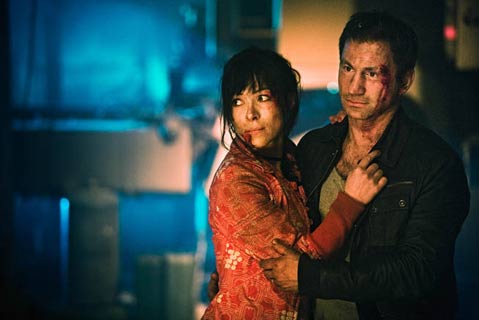The Girl Who Played with Fire
Noomi Rapace, Michael Nyqvist, and Lena Endre star in a film written by Jonas Frykberg and directed by Daniel Alfredson.

Nobody sucks down a cigarette like Lisbeth Salander. In both this film and its precursor, The Girl with the Dragon Tattoo, our somewhat mysterious protagonist—created by the late Swedish writer Stieg Larsson—comes off as an oddly androgynous female equivalent to the 1940s American action hero: close-lipped, supremely selective in the bedroom, and unquestionably capable of any derring-do activity. Lisbeth (Noomi Rapace) only betrays her gnawing demons when smoking, which she does constantly, dragging so hard her cheeks cave in and her eyes open like portals to a fear factory. Her innumerable fans surely enjoy watching Salander wreak revenge on the male chauvinist pigs that fate keeps sending after her, though I suspect it’s her not-so-hidden vulnerability that’s truly endearing: They like her fear. Otherwise. she’d be merely a stoic, computer-crunching, violence-dealing pierced chick committed to truth, justice, and the Scandinavian way.
In this second installation of the Swedish film series, we learn a lot more about what makes Lisbeth hack. As the plot moves forward, Yves Montand-like Mikael Blomkvist (Michael Nyqvist) and his magazine prepare to publish a report on sex trafficking in Stockholm, which inadvertently sends the narrative backward, activating elements of Lisbeth’s past, including that repeating flashback of child Lisbeth torching a creepy guy in a Volvo. You probably guessed why—but not how much—this human flame formed her character.
Under new director Daniel Alfredson, Fire becomes a study in golds and blues, emphasizing both the chill environment and the warmth promised to Lisbeth upon coming home. Of course, that warmth turns into conflagrations as the title rather misleadingly promises. But Alfredson doesn’t offer the same emotional control that the first film exploited, nor does he revel in the baroque sadistic sex that I’m pretty sure helped sell Dragon Tattoo to international audiences. It does end with an unexpected blow, though; a literally death-defying act that probably works better as an archetype than a curtain call. This is, after all, a thriller scored with masochistic doubts about human nature. It’s a perfect fit for a heroine who smokes: It makes her feel good but it might just kill her in the end.



